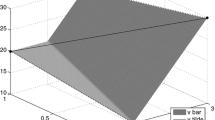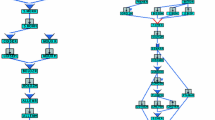Abstract
The unit commitment problem has been a very important problem in the power system operations, because it is aimed at reducing the power production cost by optimally scheduling the commitments of generation units. Meanwhile, it is a challenging problem because it involves a large amount of integer variables. With the increasing penetration of renewable energy sources in power systems, power system operations and control have been more affected by uncertainties than before. This paper discusses a stochastic unit commitment model which takes into account various uncertainties affecting thermal energy demand and two types of power generators, i.e., quick-start and non-quick-start generators. This problem is a stochastic mixed integer program with discrete decision variables in both first and second stages. In order to solve this difficult problem, a method based on Benders decomposition is applied. Numerical experiments show that the proposed algorithm can solve the stochastic unit commitment problem efficiently, especially those with large numbers of scenarios.

Similar content being viewed by others
References
Balas, E. (1979). Disjunctive programming. Annals of Discrete Mathematics, 5, 3–51.
Balas, E., Ceria, S., & Cornuéjols, G. (1993). A lift-and-project cutting plane algorithm for mixed 0-1 programs. Mathematical Programming, 58, 295–324.
Barth, R., Brand, H., Meibom, P., & Weber, C. (2006). A stochastic unit commitment model for the evaluation of the impacts of the integration of large amounts of wind power. In International conference on probabilistic methods applied to power systems (PMAPS 2006), Stockholm, Sweden, June (pp. 1–8).
Benders, J. F. (1962). Partitioning procedures for solving mixed-variables programming problems. Numerische Mathematik, 4, 238–252.
Birge, J. R., & Louveaux, F. (1997). Introduction to stochastic programming. New York: Springer.
Blair, C., & Jeroslow, R. (1982). The value function of an integer program. Mathematical Programming, 23, 237–273.
Carøe, C. C., & Tind, J. (1998). L-shaped decomposition of two-stage stochastic programs with integer recourse. Mathematical Programming, 83, 451–464.
Carpentier, P., Gohen, G., Culioli, J. C., & Renaud, A. (1996). Stochastic optimization of unit commitment: a new decomposition framework. IEEE Transactions on Power Systems, 11, 1067–1073.
Conejo, A. J., Castillo, E., Mínguez, R., & García-Bertrand, R. (2006). Decomposition techniques in mathematical programming—engineering and science applications. Heidelberg: Springer.
Cote, G., & Laughton, M. (1984). Large-scale mixed integer programming: Benders-type heuristics. European Journal of Operational Research, 16, 327–333.
Dentcheva, D., & Römisch, W. (1997). Optimal power generation under uncertainty via stochastic programming. In K. Marti & P. Kall (Eds.), Lecture notes in economics and mathematical systems: Vol. 458. Stochastic programming methods and technical applications (pp. 22–56). New York: Springer.
Fu, Y., Shahidehpour, M., & Li, Z. (2005). Security-constrained unit commitment with ac constraints. IEEE Transactions on Power Systems, 20(3), 1538–1550.
Fu, Y., Shahidehpour, M., & Li, Z. (2006). Ac contingency dispatch based on security-constrained unit commitment. IEEE Transactions on Power Systems, 21(2), 897–908.
Geoffrion, A. M. (1972). Generalized Benders decomposition. Journal of Optimization Theory and Applications, 10(4), 237–260.
Gollmer, R., Nowak, M. P., Römisch, W., & Schultz, R. (2000). Unit commitment in power generation—a basic model and some extensions. Annals of Operations Research, 96, 167–189.
Guan, Y., Ahmed, S., & Nemhauser, G. L. (2009). Cutting planes for multi-stage stochastic integer programs. Operations Research, 57, 287–298.
Hobbs, B. F., Rothkopf, M. H., O’Neil, R. P., & Chao, H. (2001). The next generation of electric power unit commitment models. Norwell: Kluwer Academic.
Laporte, G., & Louveaux, F. V. (1993). The integer L-shaped methods for stochastic integer programs with complete recourse. Operations Research Letters, 13, 133–142.
Magnanti, T., & Wong, R. (1981). Accelerating Benders decomposition: algorithmic enhancement and model selection criteria. Operations Research, 29(3), 464–484.
McDaniel, D., & Devine, M. (1977). A modified Benders partitioning algorithm for mixed integer programming. Management Science, 24, 312–319.
Ntaimo, L. (2010). Disjunctive decomposition for two-stage stochastic mixed-binary programs with random recourse. Operations Research, 58(1), 229–243.
Ntaimo, L., & Sen, S. (2008). Branch-and-cut algorithm for two-stage stochastic mixed-binary programs with continuous first-stage variables. International Journal of Computational Science and Engineering, 3(6), 232–241.
O’Neill, R., Hedman, K., Krall, E., Papavasiliou, A., & Oren, S. (2010). Economic analysis of the n−1 reliable unit commitment and transmission switching problem using duality concepts. Energy Systems, 1, 165–195.
Philpott, A., & Schultz, R. (2006). Unit commitment in electricity pool markets. Mathematical Programming, 108, 313–337.
Rei, W., Cordeau, J.-F., Gendreau, M., & Soriano, P. (2009). Accelerating Benders decomposition by local branching. INFORMS Journal on Computing, 21, 333–345.
Ruiz, P. A., Philbrick, C. R., Zak, E., Cheung, K. W., & Sauer, P. W. (2009). Uncertainty management in the unit commitment problem. IEEE Transactions on Power Systems, 24(2), 642–651.
Saharidis, G. K. D., & Ierapetritou, M. G. (2010). Improving Benders decomposition using maximum feasible subsystem (mfs) cut generation strategy. Computers & Chemical Engineering, 34(8), 1237–1245.
Saharidis, G. K. D., Minoux, M., & Ierapetritou, M. G. (2010). Accelerating Benders method using covering cut bundle generation. International Transactions in Operational Research, 17(2), 221–237.
Sen, S., & Higle, J. L. (2005). The C3 theorem and a D2 algorithm for large scale stochastic optimization: set convexification. Mathematical Programming, 104, 1–20.
Sen, S., & Sherali, H. D. (2006). Decomposition with branch-and-cut approaches for two-stage mixed-integer programming. Mathematical Programming, 106, 203–233.
Sen, S., Yu, L., & Genc, T. (2006). A stochastic programming approach to power portfolio optimization. Operations Research, 54, 55–72.
Shahidehpour, M., Yamin, H., & Li, Z. (2002). Market operations in electric power systems. New York: Wiley.
Sherali, H. D., & Adams, W. P. (1994). A hierarchy of relaxations and convex hull characterizations for mixed integer zero-one programming problems. Discrete Applied Mathematics, 52, 83–106.
Sherali, H. D., & Fraticelli, B. M. P. (2002). A modification of Benders’ decomposition algorithm for discrete subproblems: an approach for stochastic programs with integer recourse. Journal of Global Optimization, 22, 319–342.
Sherali, H. D., & Zhu, X. (2006). On solving discrete two-stage stochastic programs having mixed-integer first and second stage variables. Mathematical Programming, 108, 597–616.
Takriti, S., Birge, J. R., & Long, E. (1996). A stochastic model for the unit commitment problem. IEEE Transactions on Power Systems, 11, 1497–1508.
Tuohy, A., Meibom, P., Denny, E., & O’Malley, M. (2009). Unit commitment for systems with significant wind penetration. IEEE Transactions on Power Systems, 24(2), 592–601.
Van Slyke, R., & Wets, R. J. (1969). L-Shaped linear program with application to optimal control and stochastic linear programming. SIAM Journal on Applied Mathematics, 17(4), 638–663.
Wang, J., Shahidehpour, M., & Li, Z. (2008). Security-constrained unit commitment with volatile wind power generation. IEEE Transactions on Power Systems, 23(3), 1319–1327.
Wang, J., Botterud, A., Miranda, V., Monteiro, C., & Sheble, G. (2009). Impact of wind power forecasting on unit commitment and dispatch. In 8th int. workshop on large-scale integration of wind power into power systems, Bremen, Germany, October.
Wu, L., & Shahidehpour, M. (2010). Accelerating the Benders decomposition for network-constrained unit commitment problems. Energy Systems, 1(3), 339–376.
Zakeri, G., Philpott, A. B., & Ryan, D. M. (2000). Inexact cuts in Benders decomposition. SIAM Journal on Control and Optimization, 10(3), 643–657.
Zheng, Q. P., & Pardalos, P. M. (2010). Stochastic and risk management models and solution algorithm for natural gas transmission network expansion and LNG terminal location planning. Journal of Optimization Theory and Applications, 147(2), 337–357.
Author information
Authors and Affiliations
Corresponding author
Rights and permissions
About this article
Cite this article
Zheng, Q.P., Wang, J., Pardalos, P.M. et al. A decomposition approach to the two-stage stochastic unit commitment problem. Ann Oper Res 210, 387–410 (2013). https://doi.org/10.1007/s10479-012-1092-7
Published:
Issue Date:
DOI: https://doi.org/10.1007/s10479-012-1092-7




